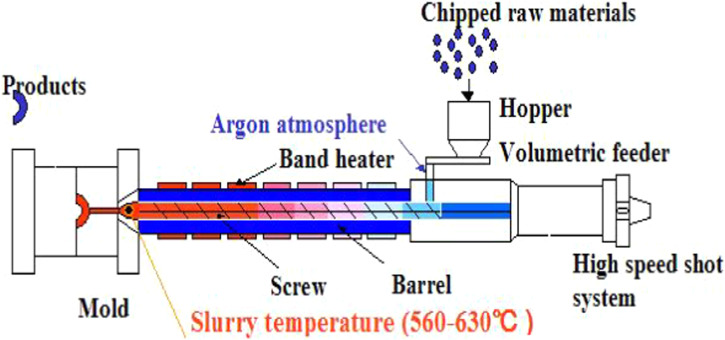In recent years, there has been a growing demand for lightweight and high-strength components in many industries, such as automotive, aerospace, and electronics. One material that has gained popularity in addressing this demand is magnesium, due to its low density, high specific strength, and good machinability. However, traditional manufacturing methods for magnesium, such as die casting and extrusion, have limitations in achieving complex geometries and high dimensional accuracy. This is where Magnesium Thixomolding comes in as an alternative manufacturing process that offers unique advantages in producing high-quality magnesium components.
Magnesium Thixomolding is a semi-solid metal forming process that uses magnesium alloys in a thixotropic state, which means that the liquid metal has a solid-like behavior due to its high viscosity and thixotropy. This state is achieved by controlling the temperature, shear conditions, and microstructure of the metal during processing. The thixotropic magnesium alloy is then injected into a mold cavity under high pressure and high speed to form the desired shape of the component. The mold is typically made of steel or aluminum and can be designed with intricate features, such as thin walls, undercuts, and ribs. The resulting parts have excellent surface finish, dimensional accuracy, and mechanical properties, such as high tensile strength, stiffness, and fatigue resistance.
One of the main advantages of Magnesium Thixomolding is its ability to produce complex and lightweight parts with high productivity and efficiency. Compared to traditional methods, such as die casting and extrusion, thixomolding requires lower processing temperatures, shorter cycle times, and less energy consumption. This means that the production costs can be significantly reduced, especially for high-volume and high-tolerance components. Furthermore, thixomolding enables the use of more sustainable and eco-friendly materials, such as recycled magnesium alloys, which can further reduce the environmental impact of manufacturing.
Another advantage of Magnesium Thixomolding is its versatility in material properties and design options. Magnesium alloys can be tailored to specific applications and requirements, such as corrosion resistance, thermal conductivity, and electromagnetic shielding. Moreover, thixomolding allows for the integration of multiple functions and parts into a single component, which can simplify assembly and reduce weight. For instance, a thixomolded automotive engine block can integrate cooling channels, oil passages, and mounting points, while reducing the weight by up to 50% compared to a conventional cast iron block.

Despite the benefits of Magnesium Thixomolding, there are also challenges and limitations that need to be addressed. One of the main challenges is the limited availability of thixomolding machines and tooling, which can restrict the scalability and accessibility of the process. Moreover, the rheological behavior of thixotropic magnesium alloys is still not fully understood, and further research is needed to optimize the processing conditions and predict the material properties. Additionally, the safety aspects of handling magnesium alloys and thixomolding should be carefully considered, as magnesium is highly flammable and can pose a fire hazard if not handled properly.
In conclusion, Magnesium Thixomolding has the potential to revolutionize the manufacturing of lightweight and high-strength components, by offering unique advantages in terms of productivity, efficiency, sustainability, and design flexibility. As the demand for magnesium-based products is expected to increase in the future, it is important to further develop and optimize the thixomolding process, as well as to educate and train the workforce in handling and processing magnesium alloys safely and effectively. By doing so, we can unlock the full potential of Magnesium Thixomolding and pave the way for a more sustainable and innovative manufacturing industry.
-

- Xüsusi hazırlanmış tökmə hissələri və komponentləri
-

- Ebike üçün maqnezium ərintisi tökmə təkər
-

- Maqnezium tökmə hissələri Sükan sütunu
-

- Populyar Uşaq İdman Velosipedi Yüksək Keyfiyyətli Uşaq Balans Velosipedi Uşaq Velosipedi
-

- OEM tökmə komponentləri və hissələri
-

- Maqnezium ərintisi tökmə elektrik avtomobili, ortada quraşdırılmış motor korpusu

 0086-750-5616188
0086-750-5616188 +86 13392089688
+86 13392089688 sales@zhongmei-tech.com
sales@zhongmei-tech.com







